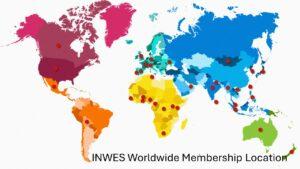The mission of INWES is “To build a better future worldwide through the full and effective participation of women and girls in all aspects of Science, Technology, Engineering, and Mathematics.”
What is INWES?
INWES is a global network of organizations of women in Science, Technology, Engineering and Mathematics (STEM), reaching over 60 countries worldwide. INWES is a not-for-profit corporation governed by a Board of Directors consisting of Directors representing organizational and individual memberships.
The International Network of Women Engineers and Scientists (INWES) was established to strengthen the capacity of individuals, organizations, and corporations to influence policies in Science, Technology, Engineering, and Mathematics (STEM) worldwide, and to encourage the education, recruitment, retention, support, and advancement of professional women and students through an international network of organizations and experts.
The goal of INWES is to build a better future worldwide through the full and effective participation of women and girls in all aspects of STEM.
This goal will be accomplished by:
- Becoming an influential voice on STEM issues for the benefit of women, gender equity, and society.
- Increasing the presence of women in mainstream STEM decision-making bodies.
- Promoting the exchange of information, networking, advocacy, and opportunities through a number of global and regional events and projects.
History of INWES
At the World Conference on Science for the 21st Century, convened by the United Nations Educational, Scientific and Cultural Organization (UNESCO) and the International Council for Science in Budapest, Article 90 was adopted encouraging special efforts to be made toward the establishment of an international network of women scientists and engineers. Through the support and encouragement of the Canadian Commission for UNESCO, and a successful grant from UNESCO, 20 women representing 10 countries and 8 organizations met in Canada, May 2001, to explore the creation of such a network.
In July 2002, the International Conference of Women Engineers and Scientists (ICWES12) delegates supported the creation of the International Network of Women Engineers and Scientists (INWES). The vote from representatives of 30 countries was unanimous. The following April 2003, INWES was incorporated as a non-profit corporation under the laws of Canada.
In November 2007, the INWES Educational and Research Institute was formed to advance education in the fields of STEM and to expand the reach of INWES through funding of special projects.
In April 2008, INWES became an official NGO partner of the operational type with UNESCO. This partnership involves dynamic cooperation to help women and girls worldwide to have access to education, especially in Science and Engineering.
Since 2017, INWES has had consultative status with ECOSOC (United Nations Economic and Social Council) and in January 2019, INWES was admitted by the Conference of the Parties as observers to the UNFCCC (United Nations Framework Convention on Climate Change). INWES supports the work of UN Women and the Commission for the Status of Women.
As of June 2019, INWES represents over 250,000 women from 60 countries around the globe.
INWES believes strength is in unity
If women are to have a significant voice, one that is heard by mainstream science and engineering on issues such as the environment, sustainable development, gender equity, and many other critical issues, then we must strive to state clearly and consistently our position and views in a united effort.
These objectives will be achieved through the collaboration between all INWES members and supporters of INWES.
Who can join INWES?
By becoming a member you can help to create a better future for everyone, and participate in worldwide discussions on how to increase the impact of women’s voices in mainstream organizations.
- Network Members: Not-for-profit organizations and associations supporting women in STEM, including women in STEM groups.
- Individual Members: Students or professionals interested or engaged in STEM and who support the aims of INWES.
- University/Institute Members: Universities or educational institutes that teach and support women in STEM.
As of 2019, commercial organizations can no longer join as members but are encouraged to set up women in STEM groups which can join INWES as network members. Businesses, companies, corporates are welcomed as supporters of INWES: donations and in-kind support are sought for INWES events and conferences including ICWES, and activities of INWES and its Regional Networks.
How does INWES operate?
- A triennial meeting of Members to elect Directors to the Board and transact business.
- An elected Board of Directors of organizations, and individuals, representing all regions of the world. See Board of Directors.
- Activities conducted through committees:
- Executive
- Policies and by-laws
- Communications
- Conferences
- Finance
- Fund development
- Membership
- Nominations
- Regional networks
- And special programs
- INWES is operated by the INWES Policies & Procedures Manual, under the By-law No. 1 approved by members on 6th January 2019, INWES CNCA Bylaw.
- INWES carries out a variety of activities, programs and projects and more on these can be found in Programs and Projects.
- For information on our legal status and further contact details, including social media links, see Contact and legal information


